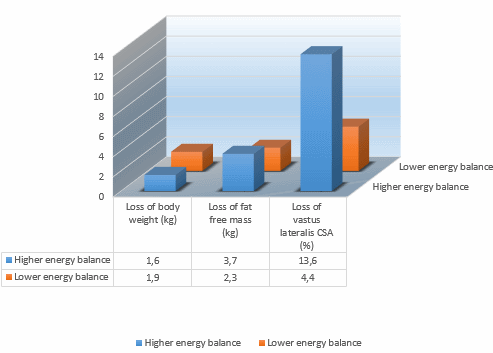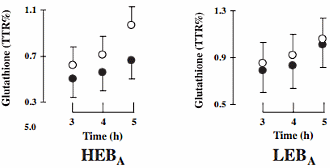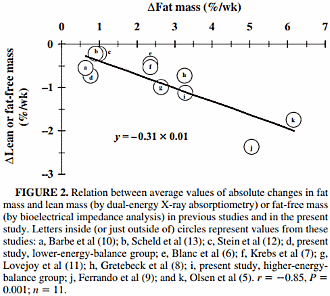|
Calorie overdose speeds up muscle breakdown during physical inactivity
Muscles disappear if you don't use them. The body breaks them down. If you are not physically active for a longer period - we're talking about weeks rather than days - then the muscle breakdown occurs faster if you put more calories into your body than you burn. The more positive your energy balance, the faster your muscles wither, discovered Italian researchers at the University of Trieste.
Study
The researchers got 19 healthy participants to lie in bed for five weeks. They were therefore unable to use their muscles. The researchers reduced the calorie intake of about half of the participants to a level that matched their inactivity. The other participants were allowed to eat as though they were still being active.
Results
The participants who consumed relatively large amounts of calories [Higher energy balance] lost more muscle mass than the participants who consumed relatively low amounts of calories [Lower energy balance].

Mechanism
The researchers found less glutathione in the blood cells of the participants who consumed relatively high amounts of calories. Glutathione is involved in making aggressive compounds harmless - including free radicals. That suggests that free radicals are involved in the breakdown of muscle tissue during inactivity.

In addition, the researchers found higher levels of inflammatory proteins in the blood of the participants who had consumed large amounts of calories. It is therefore possible that inflammatory reactions are also involved in the breakdown of muscle during inactivity.
More studies
The Italians did a literature study too and found nine other studies in which participants had been confined to bed, and researchers had measured the effect of caloric intake on muscle and fat mass. The Italians summarised the findings from these studies and their own study in the figure shown below.

The message is clear. The more fat you gain during an extended period of inactivity, the more muscle mass you lose.
Conclusion
"The present study shows that excess fat deposition during physical inactivity is associated with greater muscle loss [...]," the researchers summarise. "These mechanisms potentially contribute to long-term changes in body composition and to the cardiometabolic risk observed in sedentary persons."
The implications for athletes are clear. If they can't train for an extended period, they'll probably retain more muscle mass by making sure they don't consume too many calories.
We wonder what would happen if inactive athletes go for a negative calorie balance in these longer periods, so that they lose a little fat mass? Will the muscle mass loss also increase? Or is it a way to reduce muscle mass even further?
Source:
Am J Clin Nutr 2008;88:950-8.
More:
Can't train? Keep on using those BCAAs... 06.12.2012
Leucine retains muscle mass when you're not training 30.08.2010
Creatine keeps inactive muscle strength up 11.03.2009
Archives:
Sedentary Lifestyle
|



